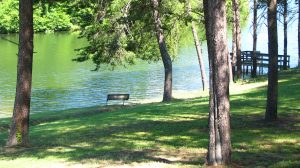Published August 23, 2010 By CED Program Interns & Students
 Leah Elliott is a rising junior in UNC’s undergraduate departments of Political Science and Public Policy and a CCP intern working in Caswell and Lenoir Counties.
Leah Elliott is a rising junior in UNC’s undergraduate departments of Political Science and Public Policy and a CCP intern working in Caswell and Lenoir Counties.
This past summer, the drive up Highway 86 to Yanceyville, N.C. was by far my favorite. Pass through downtown Hillsborough, enter a good twenty-minute drive surrounded by rolling hills, head straight and you will find yourself in the town square. Travelers driving up and down this same highway may stop in Yanceyville to visit the stately courthouse, historical museum or one of the quaint local restaurants to grab lunch. However, many probably do not know that veering to the left of the square and following West Main until one-way bridges start to appear will lead to one of Yanceyville’s hidden gems: Farmer Lake.In the small rural town of Yanceyville, what role do outdoor recreational spots like Farmer Lake play in the economic development of the area? A paper published in the Review of Urban and Regional Development Studies in 2005 argues that rural communities of the Southeast moving away from agricultural and manufacturing industries must now highlight their outdoor assets. Authors Nzaku and Bukenya conclude that “natural and recreational amenities have important implications for decision makers” and individuals will be drawn to a rural area if it has outdoor and water-based recreation. In addition to providing appeal to potential residents, Farmer Lake factors into Yanceyville’s rural tourism industry. As a place to fish, duck hunt, take a walk, go boating, or host a family/group event under the picnic shelters, Farmer Lake is something Yanceyville can be proud to share with tourists coming to the area.
Although studies touting the benefits of outdoor recreational spaces are promising, Farmer Lake and other amenities in the area face the challenge of getting the word out to prospective tourists and residents. Only when people are provided with the information about the opportunities found in rural Caswell County will they take a turn off the main highway. With a challenge of visibility and the benefits to both the lake and community in mind, Community-Campus Partnership interns worked this summer on an informational brochure to be placed in visitor centers in Caswell County. Additionally, interns provided the lake with stock photographs that will be used in the future for website development and advertising.
Source: Nzaku, Kilungu, and James O. Bukenya. 2005. “EXAMINING THE RELATIONSHIP BETWEEN QUALITY OF LIFE AMENITIES AND ECONOMIC DEVELOPMENT IN THE SOUTHEAST USA.” Review of Urban & Regional Development Studies 17, no. 2: 89-103. Academic Search Premier, EBSCOhost (accessed August 20, 2010).
Author(s)
Tagged Under
This blog post is published and posted online by the School of Government to address issues of interest to government officials. This blog post is for educational and informational Copyright ©️ 2009 to present School of Government at the University of North Carolina. All rights reserved. use and may be used for those purposes without permission by providing acknowledgment of its source. Use of this blog post for commercial purposes is prohibited. To browse a complete catalog of School of Government publications, please visit the School’s website at www.sog.unc.edu or contact the Bookstore, School of Government, CB# 3330 Knapp-Sanders Building, UNC Chapel Hill, Chapel Hill, NC 27599-3330; e-mail sales@sog.unc.edu; telephone 919.966.4119; or fax 919.962.2707.

